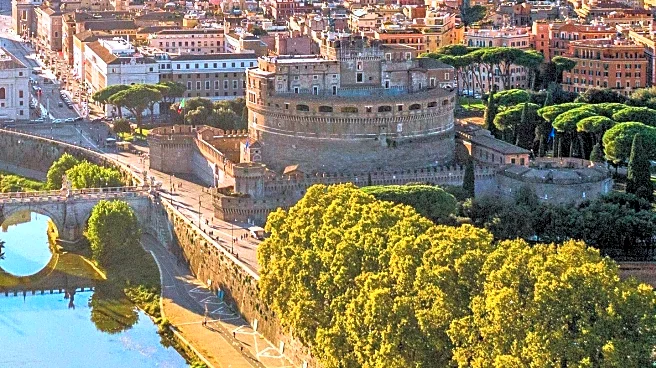What is the story about?
What's Happening?
Six Senses Rome, an eco-wellness-centric ultraluxury hotel, has opened in the heart of Rome, Italy, marking the brand's first urban property in the country. The hotel is housed in the historic Palazzo Salviati Cesi Mellini, a 15th-century building located in Rome's UNESCO-protected city center. The restoration project, led by architect Patricia Urquiola, focused on preserving key historical features while integrating modern sustainable design elements. The hotel offers a unique blend of Roman Renaissance architecture and contemporary luxury, with amenities such as a spa that reimagines ancient Roman bathing rituals and dining options that emphasize locally sourced ingredients. The project began in 2019 and opened in March 2023, despite delays due to the pandemic.
Why It's Important?
The opening of Six Senses Rome highlights a growing trend in the luxury hospitality industry towards integrating historic preservation with modern sustainability and wellness. By restoring and repurposing a historic building, the hotel not only preserves cultural heritage but also offers guests an authentic connection to the city's history. This approach aligns with increasing consumer demand for sustainable and culturally immersive travel experiences. Additionally, the hotel's commitment to community engagement, through initiatives like the restoration of the San Marcello al Corso Church façade and sourcing ingredients from local suppliers, strengthens its ties to the local community and supports the local economy. This model of luxury hospitality could influence other brands to adopt similar practices, promoting sustainability and cultural preservation in the industry.
What's Next?
As Six Senses Rome establishes itself within the luxury hospitality landscape, it is likely to continue expanding its community engagement and sustainability initiatives. The hotel's Earth Lab, which offers workshops and educational talks on sustainability, may become a focal point for both guests and locals interested in environmental conservation. Additionally, the hotel's success could encourage other luxury brands to explore similar projects in historic cities, further promoting the integration of cultural heritage and modern luxury. The hotel's reception by international travelers and locals will be crucial in determining its long-term impact and success in the competitive luxury market.
Beyond the Headlines
The integration of historic preservation and modern luxury at Six Senses Rome raises important questions about the role of luxury hotels in cultural stewardship. By preserving and showcasing historical elements, such as the fourth-century baptismal bath, the hotel not only enhances the guest experience but also contributes to the broader cultural narrative of Rome. This approach underscores the potential for luxury hospitality to play a significant role in cultural preservation and education, offering guests a deeper understanding of the destinations they visit. As more travelers seek meaningful and authentic experiences, the emphasis on cultural and historical connections may become a defining feature of the luxury hospitality industry.















